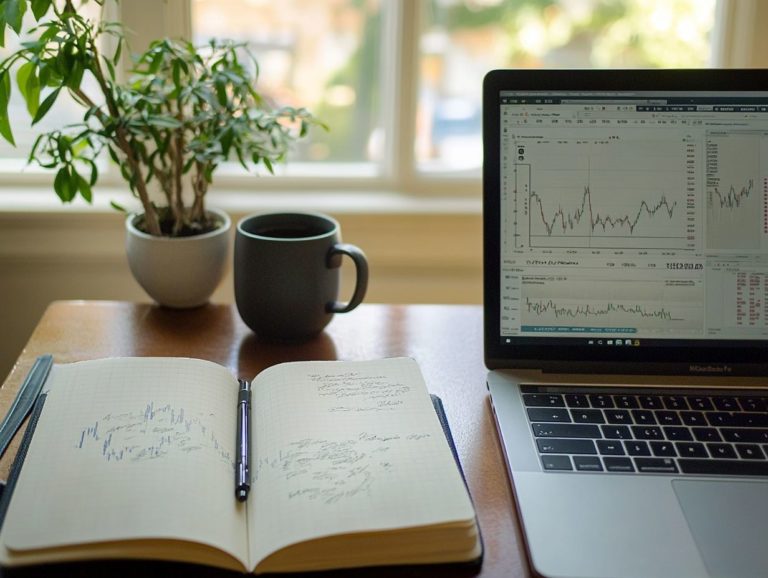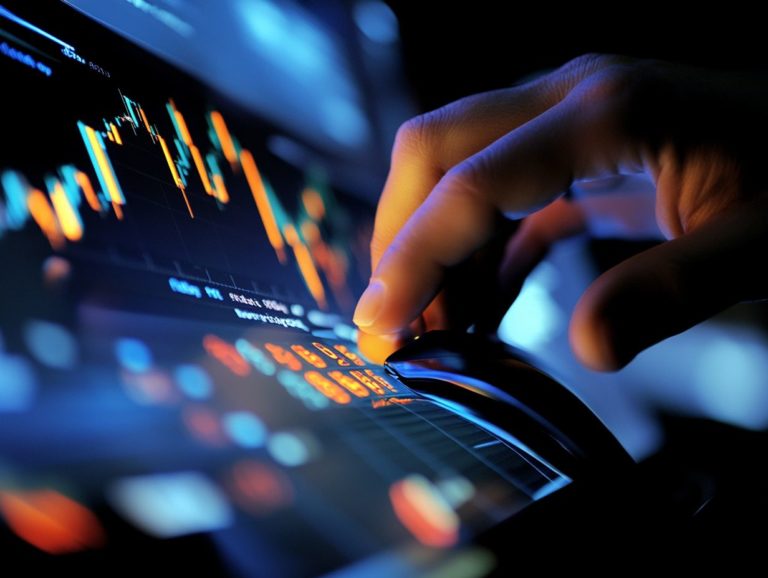Emotional Intelligence: A Trader’s Best Asset
In the fast-paced world of trading, your success hinges not just on analytical skills or market knowledge; emotional intelligence (EI) is equally vital.
This article delves into the definition of emotional intelligence and its key components, emphasizing why it s essential for traders like you. You ll discover the significant influence emotions have on trading decisions and explore effective strategies for developing your EI.
With real-life examples and case studies, we illustrate how refining this crucial skill can elevate your trading performance and decision-making.
Get ready to discover how emotional intelligence can be your biggest edge in trading!
Contents
- Key Takeaways:
- Understanding Emotional Intelligence
- Why Emotional Intelligence is Important for Traders
- The Impact of Emotions on Trading Decisions
- Developing Emotional Intelligence
- Emotional Intelligence in Practice
- Frequently Asked Questions
- What is emotional intelligence and why is it important for traders?
- How does emotional intelligence impact a trader’s performance?
- Can emotional intelligence be learned or is it a natural trait?
- What are some common signs of low emotional intelligence in traders?
- How can emotional intelligence help traders manage their risk?
- What are some strategies for improving emotional intelligence in traders?
Key Takeaways:

- Emotional intelligence is the ability to recognize and manage one’s own emotions as well as the emotions of others, and it is a crucial asset for traders to have.
- Emotions can greatly influence trading decisions, leading to impulsive and irrational choices. Traders with high emotional intelligence are better equipped to handle these emotions and make more strategic decisions.
- Strategies for improving emotional intelligence include self-awareness, self-regulation, motivation, empathy, and social skills. These can be developed through various exercises and practices.
Understanding Emotional Intelligence
Understanding emotional intelligence is essential for financial traders. It involves recognizing, comprehending, and managing your own emotions while navigating the complexities of the financial market.
This nuanced construct includes key components such as self-awareness, emotional regulation, and changing how you see challenges. These elements enhance your decision-making ability and overall psychological insight.
Emotional intelligence contributes significantly to emotional health, stability, and resilience. It enables you to cope effectively with market volatility and emotional triggers.
Definition and Components
Emotional intelligence is all about recognizing and managing your own emotions, as well as understanding the emotions of others. This ability plays a crucial role in influencing your decision-making in various contexts, including trading and emotions.
Key components of emotional intelligence include self-awareness, emotional regulation, and changing how you see challenges. Self-awareness enables you to identify your emotional triggers, allowing you to make informed decisions even when the market is in turmoil. For instance, if you recognize your anxiety during a downturn, you can take proactive steps to prevent impulsive reactions.
Emotional regulation enables you to maintain your composure. This ensures that your decisions remain rational rather than being swayed by fleeting market sentiments. On the other hand, changing how you see challenges allows you to view losses as opportunities for growth. This perspective fosters an adaptable and resilient mindset.
Together, these elements significantly enhance your ability to navigate the complexities of market psychology.
Why Emotional Intelligence is Important for Traders
Emotional intelligence is essential for you as a trader, profoundly shaping your trading decisions. It offers a solid foundation for emotional stability and resilience amid market volatility, ultimately paving the way for greater investor success. For deeper insights, consider exploring emotional resilience: a trader’s competitive edge.
By honing your emotional intelligence, you can navigate the complexities of trading with confidence and composure, particularly by overcoming emotional trading with strategies.
Start applying these emotional intelligence strategies today and transform your trading journey!
The Impact of Emotions on Trading Decisions

Emotions greatly affect your trading choices. They can lead you to make quick decisions that hurt your results if not handled properly.
As a trader, you frequently feel fear during market volatility or greed when asset prices rise. This emotional interplay can drive you to make hasty trades out of panic or overconfidence, rather than relying on informed analysis.
Recognizing these emotional triggers is essential; it enables you to implement strategies that help you maintain your composure, promoting a more rational decision-making process. By cultivating emotional intelligence, you not only become skilled at identifying these impulses but also equip yourself with the tools necessary to lessen their influence.
This boosts your trading performance and helps create a more stable market sentiment overall.
Developing Emotional Intelligence
Developing emotional intelligence requires a thoughtful approach. You should implement targeted strategies to enhance your self-awareness, ability to handle emotions, and overall emotional growth.
This is especially crucial for financial traders navigating a competitive landscape. Focusing on these skills helps you succeed in high-stakes trading.
Strategies for Improving Emotional Intelligence
To enhance your emotional intelligence as a trader, consider adopting strategies that focus on self-awareness, self-reflection, and emotional control. This approach provides you with deeper psychological insights into your trading behaviors.
By regularly practicing mindfulness techniques like meditation or journaling, you can heighten your awareness of your emotional triggers and reactions. These practices help you identify behavioral patterns that might lead to impulsive decisions and promote emotional regulation during high-pressure situations.
Acknowledging and managing your emotions leads to more careful and rational trading choices. As you develop these skills, you re likely to experience an improved sense of psychological well-being, which translates to reduced anxiety and a clearer focus on your long-term strategies. This, in turn, can optimize your performance in the financial market.
Emotional Intelligence in Practice
Emotional intelligence in practice reveals the significant advantages it brings to traders. Real-life examples and case studies demonstrate its vital role in boosting trading performance, especially in the face of fluctuating market trends.
By understanding and leveraging emotional intelligence, you can navigate the complexities of trading more effectively and learn how to keep emotions in check while trading to enhance your overall results.
Real-Life Examples and Case Studies

Real-life examples and case studies of successful traders show that emotional intelligence is closely linked to improved trading performance and a deeper understanding of market psychology.
Consider the trader who skillfully navigated volatile markets by harnessing his ability to remain calm under pressure. This composure allowed him to make rational decisions, even amidst significant market fluctuations. His self-awareness enabled him to identify his emotional responses and adjust his strategies accordingly, showcasing the importance of understanding the emotional cycle of trading in achieving successful outcomes.
Research also highlights another investor who embraced empathy and social awareness, effectively capitalizing on market trends. By understanding the emotions and sentiments of fellow traders, he was able to forecast market movements with remarkable precision.
These case studies collectively emphasize the profound impact emotional intelligence has, not just on individual trading behavior, but also on the dynamics of the market as a whole.
Frequently Asked Questions
What is emotional intelligence in trading?
Emotional intelligence in trading refers to the ability to recognize and manage your emotions and the emotions of others, which greatly influences your trading decisions.
How can I develop my emotional intelligence?
You can develop your emotional intelligence by practicing mindfulness techniques, engaging in self-reflection, and seeking feedback from peers.
Why is emotional intelligence important for traders?
Emotional intelligence is important for traders as it helps you make rational decisions, manage stress, and navigate the complexities of market emotions effectively.
Ready to improve your trading? Start applying these emotional intelligence strategies today!
What is emotional intelligence and why is it important for traders?
Emotional intelligence is the ability to understand and control your own feelings and those of others. This skill helps traders make smart decisions and build solid relationships.
How does emotional intelligence impact a trader’s performance?
A trader’s emotional intelligence directly affects their performance in the financial markets. Traders with high emotional intelligence manage their emotions and reactions to market changes better, which is crucial for mastering your emotions and leads to more successful trading outcomes.
Can emotional intelligence be learned or is it a natural trait?

Some individuals may naturally possess higher emotional intelligence. However, it is a skill that can be learned through practice and self-awareness. Traders can boost their emotional intelligence by trying different methods like self-reflection, mindfulness, and seeking feedback from others.
What are some common signs of low emotional intelligence in traders?
Traders with low emotional intelligence may make impulsive decisions and struggle to control their emotions. They may also lack empathy and often blame external factors for their mistakes, which can lead to poor trading performance and strained relationships.
How can emotional intelligence help traders manage their risk?
Emotional intelligence is vital for managing risk. It helps traders stay calm and make rational decisions, even under pressure. Understanding the connection between trading and emotional awareness can further enhance this skill, as traders with high emotional intelligence are less likely to let fear or greed affect their judgment, leading to better risk management.
What are some strategies for improving emotional intelligence in traders?
Traders can enhance their emotional intelligence by practicing self-awareness, developing empathy, and learning to regulate their emotions. They can also seek out training programs focused on emotional intelligence and actively build strong relationships with colleagues and clients. Get ready to enhance your emotional intelligence!





